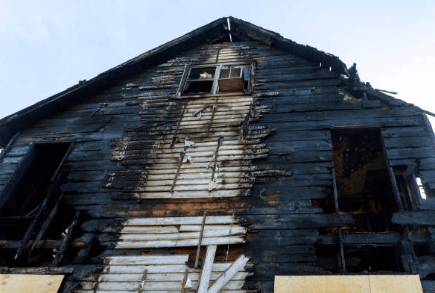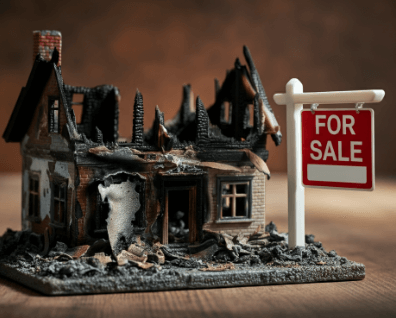When faced with the challenging task of selling a property that has experienced fire damage, homeowners in Florida may feel overwhelmed. However, navigating this process effectively can significantly ease the burden. In this blog, we will explore essential tips and strategies that will guide you on how to sell a fire-damaged house in Florida. By understanding the market, working with the right professionals, and highlighting the potential of your property, you can successfully sell a fire-damaged house in Florida and move forward with confidence.
When selling a fire-damaged house in Florida, it’s important to connect with experienced investors like Steve Daria and Joleigh, who specialize in buying properties for cash. Their expertise can help streamline the selling process, ensuring you receive a fair offer without the complexities often associated with traditional sales. By collaborating with professionals like them, you can effectively navigate the challenges of selling a damaged property.
Understanding Fire Damage
Before you sell a fire-damaged house in Florida, it’s crucial to thoroughly familiarize the extent of the damage to accurately represent the property to potential buyers.
Fire damage extends beyond the visible charred areas and can affect various components of the home in ways that might not be immediately apparent.
Smoke damage, for example, can leave lingering odors and discoloration on surfaces far from the fire’s origin.

Additionally, water damage from firefighting efforts can lead to concerns like mold growth and structural weakening, which may require specialized repair work.
Types of Fire Damage
There are several types of fire damage:
- Structural Damage: Structural damage is the most severe type of damage and involves significant harm to the house’s framework, such as the foundation, walls, or roof.
- Smoke Damage: Smoke damage can occur even if the fire didn’t directly impact certain areas, leaving behind discoloration on walls, ceilings, and other surfaces.
- Water Damage: Water damage is a common consequence of firefighting efforts, as hoses and sprinklers can saturate various parts of the house.
Assessing Damage
Get a professional to assess the damage and thoroughly evaluate the property’s condition, including both visible and hidden issues.
A detailed report from an expert will not only guide you on necessary repairs but also help you set a realistic and informed sale price.
Importance of Transparency
When you sell a fire-damaged house in Florida, transparency is vital for building trust with potential clients.
Being honest about the extent of the damage can enhance your credibility and prevent misunderstandings during the sale process.
Disclosing Damage
Florida law mandates that sellers disclose any material defects, including fire damage, to prospective buyers.
Not being able to disclose such issues can result in legal complications and potential lawsuits if buyers discover the damage after the sale.
Building Trust with Buyers
Openly discussing the fire damage and any repairs that have been made helps build trust with potential buyers by demonstrating transparency and integrity.
Providing thorough documentation of the damage assessment and the repairs completed shows that you are honest about the property’s condition, which can make the home more appealing despite its history.
Get An Offer Today, Sell In A Matter Of Days…
Repair or Sell As-Is?
Deciding whether to repair the damage or sell the house as-is involves weighing the potential benefits and drawbacks of each option.
Repairing the damage can increase the property’s market value and magnet a broader range of buyers, but it requires an upfront investment and time; selling as-is might be quicker and less costly but could result in a lower sale price and limit your buyer pool.
Pros and Cons of Repairs
When considering the sale of a fire-damaged house in Florida, weighing the potential benefits and drawbacks of making repairs before putting the property on the market is essential.
Pros:
- Higher sale price
- Attracts more buyers
Cons:
- High repair costs
- Time-consuming
Selling As-Is
Explore the advantages and disadvantages of selling a fire-damaged house in its current condition without making any repairs.
Pros:
- Quick sale
- No repair costs
Cons:
- Lower sale price
- Limited buyer pool
Pricing Your Fire-Damaged House
Pricing is critical in selling a fire-damaged house in Florida. Put the right price to attract serious buyers.
- Market Analysis: Conduct a market analysis to understand the average prices of similar properties in your area. Adjust for the fire damage to set a competitive price.
- Professional Appraisal: Consider getting a professional appraisal. An appraiser will provide an objective value, considering the fire damage and local market conditions.
Marketing Strategies
Effective marketing can help you sell a fire-damaged house faster. Highlight the potential of the property rather than just the damage.
- Highlighting Strengths: Emphasize the property’s prime location, generous size, and any unique features that set it apart from other listings, such as a large backyard or architectural charm.
- Targeted Advertising: Use online platforms to reach a wider network. Websites like Zillow, Realtor.com, and social media platforms can attract potential buyers.
Working with Professionals
Selling a fire-damaged house involves various complexities. Working with professionals can streamline the process.
- Real Estate Agents: Choose a real estate agent experienced in selling damaged properties. They can provide valuable insights and help market your home effectively.
- Contractors: If you decide to make repairs, hire reputable contractors. Ensure they have experience with fire-damaged properties and can provide quality work.
Negotiating with Buyers
Be prepared for negotiations. Buyers may request concessions due to the fire damage.
- Common Buyer Concerns: Buyers might worry about future structural issues, insurance costs, and resale value.
- Addressing Concerns: Provide documentation of repairs and warranties. Be flexible with negotiations to reach a mutually beneficial agreement.

Legal Considerations
Understanding the legalities of selling a fire-damaged house in Florida is crucial. Consult a real estate attorney to comply with all laws.
- Disclosure Requirements: Florida law mandates full disclosure of property defects. Not being able to disclose can lead to legal repercussions.
- Closing the Sale: Ensure all legal documents are in order. Work with your attorney and real estate agent to facilitate a smooth closing process.
Frequently Asked Questions
Explore common queries and provide valuable insights for homeowners navigating the complex process of selling a fire-damaged house in Florida.
Is it possible to sell a severely fire-damaged house?
Yes, it is possible to sell a severely fire-damaged house, but the process might be more complex and time-consuming compared to selling a property in good condition.
Specialized marketing strategies, such as targeting investors or buyers looking for fixer-uppers, can help you reach potential buyers and achieve a successful sale.
Should I repair minor damages before selling?
Repairing minor damages before selling can significantly boost the property’s curb appeal and make it more appealing to prospective buyers.
Even small fixes can enhance the overall perception of the home, potentially leading to a higher sale price and a quicker sale.
Can I sell my fire-damaged house without a real estate agent?
Yes, you can sell your fire-damaged house without a real estate agent, but it might require more effort on your part to handle negotiations and paperwork.
Working with an agent can simplify the process, give access to a broader network of potential buyers, and help you navigate the complexities of selling a damaged property.
Conclusion
While it’s undoubtedly challenging to sell a fire-damaged house in Florida, with careful planning, transparency, and the right help, you can turn this daunting task into a rewarding experience. Remember to assess the damage, decide on repairs, set a competitive price, and market effectively. If you’re ready to take the next step, consult with a representative who can guide you through the process. Happy selling!
**NOTICE: Please note that the content presented in this post is intended solely for informational and educational purposes. It should not be construed as legal or financial advice or relied upon as a replacement for consultation with a qualified attorney or CPA. For specific guidance on legal or financial matters, readers are encouraged to seek professional assistance from an attorney, CPA, or other appropriate professional regarding the subject matter.

